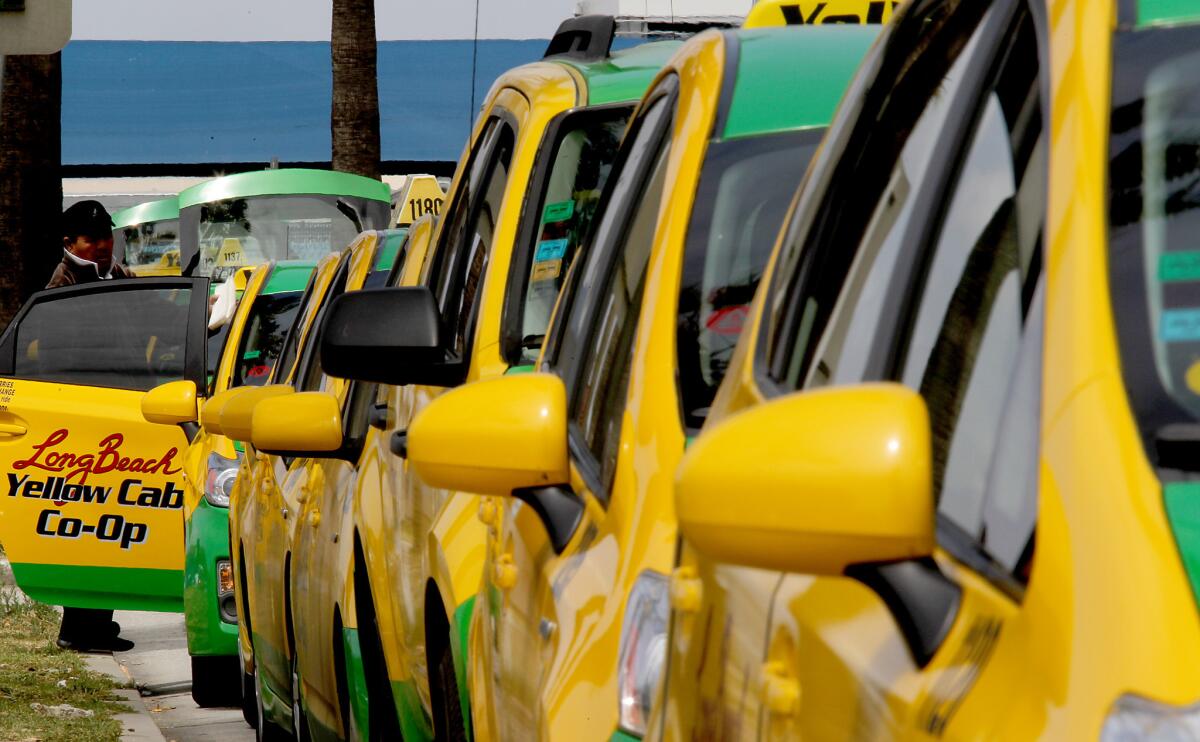With Uber battle raging, one state lawmaker wants to deregulate the taxi industry

A taxi driver cleans his cab while waiting for a fare at the Long Beach Airport.
Reporting from Sacramento — Taxi companies and the ride-hailing industry agree: Stricter regulations on taxis are strangling cabs’ ability to compete.
But rather than adding to the rules governing Uber and Lyft, an effort that has seen limited success in Sacramento in recent years, Assemblyman Evan Low (D-Campbell) wants to deregulate the taxi industry.
Low has introduced a bill, AB 650, that would allow taxi companies to set their own prices, streamline licensing, background check and insurance requirements and shift regulatory authority from local governments to the state in an effort to better mirror the rules governing Uber and Lyft.
“The taxicabs need fair competition,” Low said.
The ride-hailing companies’ emergence in recent years, spurred by cheaper rides and looser restrictions on their operations, have threatened the taxi industry as a whole. In Los Angeles, for instance, taxi trips arranged in advance are down by nearly half over the last three years.
In hearing after hearing at the Capitol, taxi drivers have lamented the tougher rules on their industry, including fixed prices, strict background checks and vehicle inspections and prohibitions against transporting passengers between cities. Uber, Lyft and other tech industry advocates agree the current situation is unfair for taxis. But they say the solution is to ease taxi restrictions rather than apply them to ride shares.
This argument is gaining steam in Sacramento beyond Low’s bill. Last week, a Senate committee killed legislation that would have regulated the companies’ surge-pricing model, among other rules. In that hearing, Sen. Ben Allen (D-Santa Monica) said the focus on adding ridesharing regulations was wrong.
“We need to help the taxis out rather than doubling down on an increasingly broken strategy,” Allen said.
The taxi industry’s response to Low’s bill, however, has been far from acclaim. Mark Gruberg, a board member of the union representing San Francisco taxi drivers, said some taxi regulations, such as those that prohibit San Francisco taxis from picking up passengers in Oakland, could be wiped away. But he doesn’t trust the state to create necessary consumer and driver protections, let alone enforce them as well as cities do now.
“There’s just a lot of bad stuff in here, and I don’t think it’s the right approach,” Gruberg said of Low’s bill.
Low has proposed giving control over taxi regulations to the California Public Utilities Commission, the agency in charge of ride-hailing rules. The head of that agency — which is also responsible for regulating power companies — has said the commission is already stretched too thin and has been trying to shed its ride-hailing responsibilities.
Low said the Public Utilities Commission is the only agency with the expertise to handle taxis, but he’s aware of the complaints about its broad mandate. He’s open to a different agency regulating taxis and developing details about how loosening taxi price restrictions and other major parts of the bill would work.
“These regulations haven’t been updated since before I was born,” Low said. “They need to be modernized.”
Follow @dillonliam on Twitter
ALSO:
Uber and Lyft have devastated L.A.’s taxi industry, city records show
California bill seeking to limit surge pricing by Uber and Lyft dies
More to Read
Get the L.A. Times Politics newsletter
Deeply reported insights into legislation, politics and policy from Sacramento, Washington and beyond. In your inbox three times per week.
You may occasionally receive promotional content from the Los Angeles Times.











